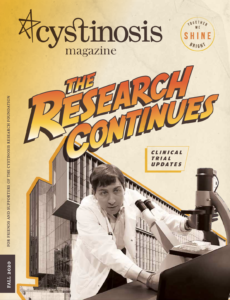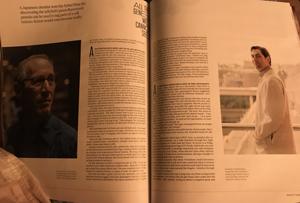
Dr. Freedman channeling Indiana Jones on the cover of Cystinosis Magazine
The Freedman lab seeks to make fundamental discoveries in scientific understanding to advance the real-world goals of tissue regeneration, gene therapy, and drug development. Our model system is the human kidney, a beautiful and complex organ in need of innovative therapies. Our work appears in highly respected, peer-reviewed international science journals and has been featured in a variety of popular press outlets.
-

Cell Shorts | Illuminating the Kidney
-

UW researchers use robots to grow mini-kidneys to help cure disease
-

What We Do (Support NKF)
-

A PKD patient's story
-

2018 Stem Cells Young Investigator Award
-

New gene editing technology: What it could mean for the future of PKD
Would You Like Chips With That? High-Tech Alternatives Could Replace Animal Testing. In Vivo. March 15, 2023. The potential of organs-on-chips to replace animals in research is discussed, in the context of FDA Modernization Act 2.0.
Animal Testing No Longer Required For Drug Approval. But High-Tech Substitutes Aren’t Ready. USA Today, Jan. 15, 2023. Organoids brandish a new role as the FDA Modernization Act 2.0 is signed into law. Are we ready?
New 3-D Model Offers Insights Into the Role of Glucose in a Deadly Kidney Disease. NIH NCATS News Releases. Jan. 5, 2023. Including flow in mini-kidney devices brings them closer to reality – and produces new directions for drug development for polycystic kidney disease.
Study Illuminates Sugar’s Role In Common Kidney Disease. UW Medicine Newsroom. Jan. 5, 2023. Mini-kidneys provide new insights into how cysts form in polycystic kidney disease, with a surprising role for sugar uptake.
Cilia-free stem cells offer new path to study rare diseases. UW Medicine Newsroom. Apr. 27, 2022. The ciliopathies, a spectrum of disorders involving polycystic kidney disease, are brought to light using organoids that lack cellular ‘antennae.’
Freedman lab explores the role cilia play in signaling, cell fate, and disease development. ISCRM Newsletter, Apr. 27, 2022. A stem cell view of cilia function, as revealed in our new cilia knockout cell lines.
SARS-CoV-2 can infect kidneys directly, researchers find. UW Medicine Newsroom. Nov. 28, 2021. Summary of recent research showing that COVID-19 can infect organoids, with an emphasis on the clinical ramifications of this finding.
ISCRM Research Sheds New Light on COVID-19 and Kidney Health. ISCRM Newsletter, Dec. 1, 2021. Investigators within our stem cell institute develop therapies to combat COVID-19, and uncover a role for the disease in kidneys.
Publication of the Week: Cross-Validation of SARS-CoV-2 Responses in Kidney Organoids and Clinical Populations. Science in Seattle, Nov. 28, 2021. Brief interview with Dr. Freedman on the new publication modeling COVID-19 in kidney organoids.
Q&A: Mini organs offer hints to COVID-19’s kidney injury. UW Medicine Newsroom. Feb. 8, 2021. An interview with Dr. Freedman on the role of COVID-19 in the kidney, and how organoids might help.
Harnessing the power of nanobodies to rebuild kidneys. UW Medicine Newsroom. Oct. 18, 2020. A new consortium effort by the National Institutes of Health will examine a powerful drug development tool that has potential to target the kidneys.
The Research Continues: Developing A Therapeutic Strategy For Cystinotic Nephropathy With iPS Cells. Cystinosis Magazine, August 20, 2020. A research update on our exciting project to develop iPS cells to model cystinosis and its therapy.
Organoids as Pre-Clinical Models of Human Disease. New England Journal of Medicine, Feb. 7, 2019. Podcast interview with Dr. Freedman about the potential of human organoids for understanding – and potentially treating – disease.
Growing Organoid Models for Studying the Most Common Kidney Diseases. FutureTech Podcast, Nov. 6, 2018. Podcast interview with Dr. Freedman about the value of organoids as a new technology.
For His Uncle. UW Medicine Newsletter, Oct. 25, 2018. Interview about Dr. Freedman’s motivation to find better cures for kidney disease.
 Stranger Genes: How Seattle Scientists are Advancing Gene Editing. Seattle Met, July 17, 2018. In-depth magazine article on how Emerald City scientists are pushing the horizons of gene editing in disease research.
Stranger Genes: How Seattle Scientists are Advancing Gene Editing. Seattle Met, July 17, 2018. In-depth magazine article on how Emerald City scientists are pushing the horizons of gene editing in disease research.
Ep. 119: Kidney Organoids. The Stem Cell Podcast, June 19, 2018. Thoughts on the stem cell ‘singularity’, mysteries of PKD, and advice for young scientists.
How a robotic system that grows human organoids can help save real live humans. Geekwire, May 17, 2018. Comparisons to Westworld are made in this insightful commentary to our recent Cell Stem Cell paper.
Robots are able to grow human organs for the first time thanks to UW researchers. Fox News, May 22, 2018. This news piece includes a short video summarizing how robots are used to generate organoids.
Re-Creating Disease with Kidney Organoids and CRISPR. STEMCELL Technologies Webinar, May 8, 2018. A webinar by Dr. Freedman for STEMCELL technologies, describing how gene editing + organoids = disease in a dish for the kidney.
Organoids: Modelling polycystic kidney disease. Nature Materials 16, 1058–1059 (2017). An expert commentary on our Nature Materials paper describing a role for microenvironment in human PKD cyst formation.
Polycystic kidney disease: Modulation of cystogenesis by the microenvironment. Nature Reviews Nephrology 13, 723 (2017). Brief summary in layman’s terms of our recent paper in Nature Materials.
Growing kidney diseases in a dish. Naked Scientists podcast (BBC), October 18, 2017. Dr. Freedman is interviewed regarding the potential of kidney organoids to discover drugs for polycystic kidney disease.
Mini-kidneys grown in lab reveal renal disease secrets. Medical Express, October 2, 2017. A summary of our recent work demonstrating how kidney organoids can teach us how kidney diseases actually work. (Over 2,000 ‘likes’ on Facebook)
Why the UW is sending a kidney into outer space. Columns Magazine, September 28, 2017. How kidney-on-a-chip and kidney organoids are bringing Star Trek closer to reality.
Gene Editing May Offer Clues, Future Treatments for Kidney Disease. ASN Kidney News 9:5, May 2017. Dr. Freedman is quoted regarding the potential of gene editing techniques, such as CRISPR, for diagnosing, studying, and ultimately treating kidney disease.
Paul Allen’s Latest Science Project: a Psychedelic Way to Peer Inside Cells. The Seattle Times, April 5, 2017; Machine Learning Predicts the Look of Stem Cells, Nature News. April 5, 2017. In these articles, Dr. Freedman is quoted on how the Allen Institute’s Cell Collection and Cell Explorer tools can be used to study disease processes.
NephMadness 2017: the Case for CRISPR-Cas9. AJKD Blog. April 3, 2017. In this blog post, Dr. Freedman provides a fun synopsis of why CRISPR-Cas9 gene editing is of paramount importance for kidney medicine.
With CRISPR, Modeling Disease in Mini Organs. The Scientist. May 6, 2016. An article capturing the zeitgeist of using genetically edited organoids for understanding and treating diseases like cystic fibrosis, cancer, and polycystic kidney.
New gene editing technology: What it could mean for the future of PKD. PKD Foundation Webinar Wednesdays Series, March 18, 2016. In layman’s terms, this webinar explains the fundamentals of gene editing with CRISPR and how it might impact PKD therapy.
Modelling Disease in Kidney Organoids. Nature Reviews Nephrology 12:4 (2016). doi: 10.1038/nrneph.2015.181. Highlighting the generation of kidney organoids with disease phenotypes using CRISPR.
A New Gene Editing Technique Turns Human Pluripotent Stem Cells into a Model System for Polycystic Kidney Disease. American Society for Cell Biology, December 14, 2015. How using gene editing enables us to re-create PKD in human organoids.
Scientists Grow ‘Mini-Kidneys’ in Petri Dishes. Futurity News, October 27, 2015. Focusing on the discovery of human kidney organoids from pluripotent stem cells as a new tool for disease modeling and regeneration.
The PKD Research Experience. PKD Connection, October 26, 2015. Dr. Freedman describes what it’s like to do science in a column for the PKD Foundation – over 400 shares on Facebook!
Engineering Kidneys for Treatments and Transplants. National Kidney Foundation, January 15, 2015. Over 400 shares and 1,000 likes on Facebook! It’s great getting comments and feedback from patients.
Kidney Cells Generated from Stem Cells. MedPage Today, January 12, 2014. Our first success towards creating kidney cells from human pluripotent stem cells.
Research Findings Point to New Therapeutic Approach for Common Cause of Kidney Failure. ASN, Sept. 5, 2013. Our first success towards modeling PKD phenotypes with human pluripotent stem cells.
Induced Pluripotent Stem Cells from Polycystic Kidney Disease Patients: a Novel Tool to Model the Pathogenesis of Cystic Kidney Disease. JASN, Oct. 2013. A commentary on our article generating iPS cells from patients with PKD and showing the first kidney-relevant phenotype in these cells.
